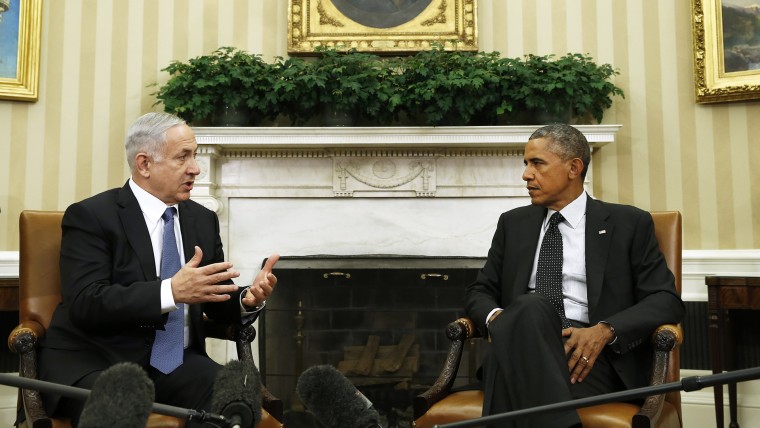If online chatter is any indication, a Wall Street Journal report published last night on U.S. surveillance programs and Israeli Prime Minister Benjamin Netanyahu is causing quite a stir.
The U.S., pursuing a nuclear arms agreement with Iran at the time, captured communications between Mr. Netanyahu and his aides that inflamed mistrust between the two countries and planted a political minefield at home when Mr. Netanyahu later took his campaign against the deal to Capitol Hill. The National Security Agency's targeting of Israeli leaders and officials also swept up the contents of some of their private conversations with U.S. lawmakers and American-Jewish groups. That raised fears -- an "Oh-s*** moment," one senior U.S. official said -- that the executive branch would be accused of spying on Congress.
Let's unwrap this a bit, because it gets a little tricky.
In March, the Journal reported that Israel spied on U.S. officials and others involved in the international nuclear talks with Iran, penetrating the negotiations, and "acquiring" confidential U.S. materials. This didn't come as too big of a surprise -- rumors about Israeli intelligence officials operating on American soil have been common for years, U.S. officials have "largely tolerated Israeli snooping."
This round of espionage, however, was more offensive to the Obama administration because Israelis appear to have shared sensitive information with Republicans in the hopes of sabotaging American foreign policy. As a senior U.S. official put it at the time, "It is one thing for the U.S. and Israel to spy on each other. It is another thing for Israel to steal U.S. secrets and play them back to U.S. legislators to undermine U.S. diplomacy."
The spying, we now know, didn't pan out -- the P5+1 talks were productive, and the United States and our negotiating partners eventually struck a deal.
That was Part I of the story. Part II is where things got really interesting.
Netanyahu and his team tried and failed to derail the diplomatic efforts, but they still had hopes of sabotaging American foreign policy through Congress. For intelligence agencies, this created a real dilemma. On the one hand, the very idea of U.S. intelligence agencies spying on members of the U.S. Congress is a major problem. On the other hand, U.S. intelligence agencies spying on a foreign government actively trying to subvert American policy is about as common as a sunrise.
The tricky part, obviously, is the challenge facing intelligence officials when it's American members of Congress who are coordinating -- and to a degree, partnering -- with a foreign government to undermine the foreign policy of the United States. Such a dynamic has no real precedent in the American tradition, but in the Obama era, radicalized congressional Republicans have made this rather commonplace.
For the NSA, the solution apparently meant threading a needle: the agency continued its surveillance of Israel while Israeli officials tried to kill U.S. policy, which in practice meant intercepting communications between Israel and American lawmakers. The agency would report on its findings, but it also "removed the names of lawmakers from intelligence reports," "weeded out personal information" related to congressional Republicans, and kept out "trash talk" in which members made private, personal attacks against Obama administration officials during their talks with the lawmakers' foreign allies.
In other words, the NSA appears to have deliberately spied on Israel, not members of Congress who talked to Israel about how best to scuttle American foreign policy.
Is that kosher? Rep. Adam Schiff (D-Calif.), the ranking member on the House Intelligence Committee, suggested to the Journal that there is no real scandal here. "From what I can tell, we haven't had a problem with how incidental collection has been handled concerning lawmakers," Schiff said.
As for the Republicans who are apoplectic this morning, there is some irony to their complaints. This is, after all, a party that generally supports an expansive surveillance state, especially when it comes to keeping tabs on foreign governments trying to subvert the United States. If that means American communications with foreigners, the argument goes, get caught up in the net, so be it.
The GOP appears to be angry today, however, because in this case, it was Republican members of Congress who were talking with foreigners about sabotaging U.S. policy.
